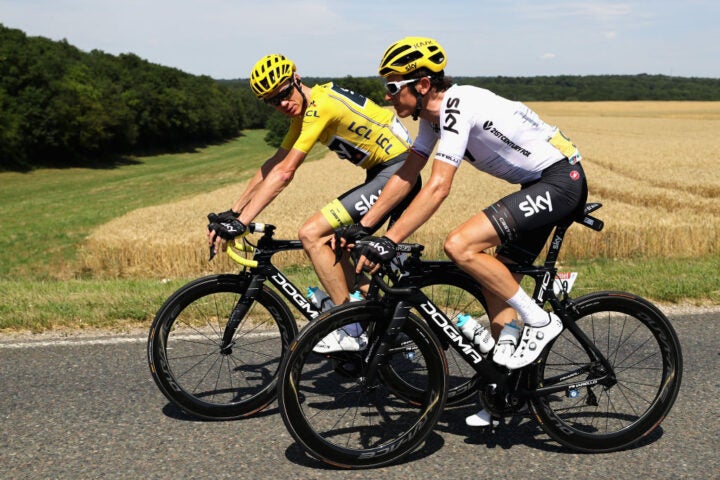Is It Time to Reconsider ‘Fasted Training’? Study Questions Benefit
“], “filter”: { “nextExceptions”: “img, blockquote, div”, “nextContainsExceptions”: “img, blockquote, a.btn, a.o-button”} }”>
Heading out the door? Read this article on the new Outside+ app available now on iOS devices for members!
>”,”name”:”in-content-cta”,”type”:”link”}}”>Download the app.
Remember the craze for low carbohydrate and fasted training that followed in the wheel tracks of Team Sky’s Tour de France-winning methodology?
A new study has called into question the effectiveness of the “marginal gain” nutritional intervention that Chris Froome, Bradley Wiggins, and Geraint Thomas used during the last decade to supposedly promote a fat-burning engine that preserves precious glycogen stores.
The paper, which was co-authored by UAE Emirates’ performance guru and Tadej Pogačar‘s personal coach Iñigo San Millán, suggests it’s time to rethink the often controversial principle of fasted training.
Titled “A Five-Week Periodized Carbohydrate Diet Does Not Improve Maximal Lactate Steady-State Exercise Capacity and Substrate Oxidation in Well-Trained Cyclists compared to a High-Carbohydrate Diet”, the study puts a big questionmark over many of the perceived benefits of the much-debated low-carb approach.
And what’s more, it adds further momentum into the swing toward the super-high carb fueling strategies that are speeding up modern pro cycling.
Also read:
The experiment had one group of highly trained riders follow a high-carb diet, and another take a periodized approach to fueling that entailed multiple low-carb rides. Both groups then followed an identical five-week training program.
The result?
Those riding with a low- or no-carbohydrate strategy weren’t rewarded with an extra-efficient fat burning engine.
“We found no differences in carbohydrate or lipid [i.e., fat] oxidation, heart rate, and post-exercise lactate concentration,” concluded the paper, which was recently published in the journal Nutrients.
“Periodizing the carbohydrate intake in well-trained cyclists during a five-week intervention did not elicit superior results to an energy intake-matched high-carbohydrate diet in any of the measured outcomes.”
Eat carbs, crush races
New formulations in drinks and gels allow riders to consume more carbohydrate than ever before. (Photo: ANNE-CHRISTINE POUJOULAT/AFP via Getty Images)
Sure, so the study is based on a sample of just 17 riders, and was based over a relatively short time frame.
The participants were racing at U23 national-level races and so fall somewhere in the middle of recreational weekend warriors and fully invested WorldTour pros, and so it’s hard to extend particular conclusions to either group.
But the findings were intriguing nonetheless, and put further fuel into a recent era-defining shift in training and nutritional thinking.
Also read: Inside Team Sky’s feeding strategies
Low-carb fueling strategies have been around for dozens of years, but really came to the worldview when Team Sky rampaged through the Tours de France of last decade.
“Fortress Froome” was built in part around a “fuel for the work required” ethos that included long, low-intensity training powered only by black coffee and bloodymindedness.
Occasionally – as Froome famously showed on social media with a snap of his egg n’avo breakfast – a fat-rich, low-carb meal would carry Team Sky riders through six-hour sufferfests up and down the Teide volcano.
The protocol was said to promote a fat-burning metabolism, giving benefit to both racing economy and body composition. Promoting a furnace of fat means precious glycogen stores are preserved for the attacks and breakaways that win big races, and also improves the watt-kilo equation.
Rest day breakfast #TDF #TDF2016 pic.twitter.com/gRjKMJtL2K
— Chris Froome (@chrisfroome) July 19, 2016
The cycling community saw Team Sky’s success, and took note. “Fasted training” became the thing.
But with that approach comes a myriad of risk factors.
Many pros and even more amateurs have been burned out or buried into disordered eating behaviours when attempting to train sans sugars. Prolonged low-energy availability can lead to overtraining syndrome, malfunctioning hormones, brittle bones, and a nosedive in mental health.
Fast forward a decade from the height of the Team Sky era to 2024, and a lot has changed.
Riders chow energy-loaded carbs like crazy, and so are able to hit training sessions harder, and recover faster.
It’s been a paradigm shift that’s helped speed up pro cycling.
“Having a crazy diet back then definitely affected your mood, but that’s a big change,” Team Sky/Ineos veteran Thomas recently told The Times.
“We still have a few low-carb rides, but now I tend to fuel the rides a lot more. Then I’m not as hungry off the bike, so I eat less. When you’re riding, that’s when your metabolism’s working and you’re just burning [weight]. That’s the new thinking; it has been working.”
Fasted training is still a thing … for now

As Thomas alluded to, low-carb rides still have a place in WorldTour training programs.
Team trainers and nutritionists told Velo during our dive into the “carbohydrate revolution” that a low-carb protocol is used sparingly and at carefully considered times in the calendar.
The study published last month concurs that fasted training is still “a thing.”
“High carbohydrate and periodized carbobydrate diets have a place when planning a diet, as long as they are carried out according to prescribed training,” it stated.
“Likewise, today, high carbohydrate diets have a greater place in endurance sports where high glycogen concentrations are demanded and in exercises or training where carbohydrate oxidation is essential [i.e., more intense sessions – ed].”
These new investigations are limited in scope and so the findings can’t be seen as final.
But there’s no denying that today’s extra-intense peloton requires the fast fuel of sugars and starches more than ever before.
Training to a high-carb protocol allows riders to max out their physiology for the moves that explode the cobblestones and HC-climbs of the modern sport’s biggest races. It also toughens their digestive systems for the overload of gels and sport drinks that support the effort.
So perhaps it’s not quite time to call time on fasted training, but this new study provides fuel for thought, and fuel for the carb-burning furnace, nonetheless.
No Byline Policy
Editorial Guidelines
Corrections Policy
Source